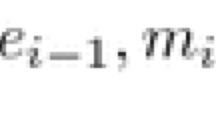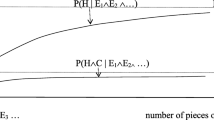Abstract
The concepts of coherence and confirmation are closely intertwined: according to a prominent proposal coherence is nothing but mutual confirmation. Accordingly, it should come as no surprise that both are confronted with similar problems. As regards Bayesian confirmation measures these are illustrated by the problem of tacking by conjunction. On the other hand, Bayesian coherence measures face the problem of belief individuation. In this paper we want to outline the benefit of an approach to coherence and confirmation based on content elements. It will be shown that the resulting concepts, called genuine coherence and genuine confirmation, can be used in order to solve the two mentioned problems. In a final section we present some results on degrees of genuine coherence and genuine confirmation.
Similar content being viewed by others
References
Bienvenu M.: Prime implicates and prime implicants: From propositional to modal logic. Journal of Artificial Intelligence Research 36, 71–128 (2009)
BonJour L.: The Structure of Empirical Knowledge. Harvard University Press, Cambridge (1985)
Brössel P.: The problem of measure sensitivity redux. Philosophy of Science 80, 378–397 (2013)
Carnap R.: Logical Foundations of Probability. University of Chicago Press, Chicago (1950)
Chandler J.: Contrastive confirmation: some competing accounts. Synthese 190, 129–138 (2013)
Christensen D.: Measuring confirmation. Journal of Philosophy 96, 437–461 (1999)
Crupi, V., Confirmation, The Stanford Encyclopedia of Philosophy (Fall 2015 Edition), E. N. Zalta (ed.), 2015. http://plato.stanford.edu/archives/fall2015/entries/confirmation/.
Crupi V., Tentori K.: Irrelevant conjunction: Statement and solution of a new paradox. Philosophy of Science 77, 1–13 (2010)
Crupi V., Tentori K., Gonzales M.: On Bayesian measures of evidential support: theoretical and empirical issues. Philosophy of Science 74, 229–252 (2007)
DouvenI. Meijs W.: Measuring coherence. Synthese 156, 405–425 (2007)
Earman, J., Bayes or Bust? A Critical Examination of Bayesian Confirmation Theory, MIT Press, Cambridge, 1992.
Festa R.: ‘For unto every one that hath shall be given’: Matthew properties for incremental confirmation. Synthese 184, 98–100 (2012)
Fitelson B.: The plurality of Bayesian measures of confirmation and the problem of measure sensitivity. Philosophy of Science 66, 362–378 (1999)
Fitelson B.: Putting the irrelevance back into the problem of irrelevant conjunction. Philosophy of Science 69, 611–622 (2002)
Fitelson B.: A probabilistic theory of coherence. Analysis 63, 194–199 (2003)
Fitelson B.: Likelihoodism, Bayesianism, and relational confirmation. Synthese 156, 473–489 (2007)
Friedman M.: Explanation and scientific understanding. Journal of Philosophy 71, 5–19 (1974)
Gemes K.: Hypothetico-Deductivism, content, and the natural axiomatization of theories. Philosophy of Science 54, 477–487 (1993)
Glass, D. H., Coherence, explanation, and Bayesian networks, in M. O’Neill et al. (ed.), Artificial intelligence and cognitive science. 13th Irish International Conference (Proceedings), Springer, Berlin, 2002, pp. 177–182.
Glymour C.: Theory and Evidence. Princeton University Press, Princeton (1981)
Good I. J.: The best explicatum for weight of evidence. Journal of Statistical Computation and Simulation 19, 294–299 (1984)
Hawthorne J., Fitelson B.: Discussion: re-solving irrelevant conjunction with probabilistic independence. Philosophy of Science 71, 505–514 (2004)
Hempel, C. G., Aspects of Scientific Explanation and Other Essays in the Philosophy of Science, Free Press, New York, 1965.
Horwich, P., Probability and Evidence, Cambridge University Press, Cambridge, 1982.
Keynes J. M.: A Treatise on Probability. Macmillan, London (1921)
Kitcher P.: Comments and criticism: explanation, conjunction, and unification. Journal of Philosophy 73, 207–212 (1976)
Koscholke, J. and M. Schippers, Against relative overlap measures of coherence. Forthcoming in Synthese, 2015. doi:10.1007/s11229-015-0887-x
Kuipers T. A. F., From Instrumentalism to Constructive Realism, Reidel, Dordrecht, 2000.
Meijs W.: Coherence as generalized logical equivalence. Erkenntnis 64, 231–252 (2006)
Milne, P. (1996). \({\log[P(h|eb)/P(h|b)]}\) is the one true measure of confirmation. Philosophy of Science 63, 21-26.
Moretti L., Akiba K.: Probabilistic measures of coherence and the problem of belief individuation. Synthese 154, 73–95 (2007)
Mortimer H.: The Logic of Induction. Prentice Hall, Paramus (1988)
Nozick R.: Philosophical Explanations. Clarendon, Oxford (1981)
Olsson E. J.: What is the problem of coherence and truth?. Journal of Philosophy 94, 246–272 (2002)
Popper K. R., Miller D. W.: A proof of the impossibility of inductive probability. Nature 302, 687–688 (1983)
Quine W. V. O.: A way to simplify truthfunctions. American Mathematical Monthly 62, 627–631 (1955)
Rips L. J.: Two kinds of reasoning. Psychological Science 12, 129–134 (2001)
Roche, W., Coherence and probability. A probabilistic account of coherence. in M. Araszkiewicz and J. Savelka (eds.), Coherence: Insights from Philosophy, Jurisprudence and Artificial Intelligence, Springer, Dordrecht, 2013, pp. 59-91.
Roche W.: Confirmation, increase in probability, and partial discrimination: a reply to Zalabardo. European Journal for Philosophy of Science 6, 1–7 (2016)
Schippers, M., Probabilistic measures of coherence. From adequacy constraints towards pluralism. Synthese 191:3821–3845, 2014a.
Schippers, M., Structural properties of qualitative and quantitative accounts to coherence, The Review of Symbolic Logic 7:579–598, 2014b.
Schippers M.: Towards a grammar of Bayesian coherentism. Studia Logica 103, 955–984 (2015)
Schlesinger G. N.: Measuring degrees of confirmation. Analysis 55, 208–212 (1995)
Schupbach J. N.: New hope for Shogenji’s coherence measure. The British Journal for the Philosophy of Science 62, 125–142 (2011)
Schurz G.: Relevant deduction. Erkenntnis 35, 391–437 (1991)
Schurz G.: Bayesian pseudo confirmation, use-novelty, and genuine confirmation. Studies in the History and Philosophy of Science 45, 87–96 (2014)
Schurz G., Lambert K.: Outline of a theory of scientific understanding. Synthese 101, 65–120 (1994)
Schurz G., Leitgeb H.: Finitistic and frequentistic approximations of probability measures with or without sigma-additivity. Studia Logica 89, 258–283 (2008)
Schurz G. Weingartner P.: Zwart and Franssen’s impossibility theorem holds for possible-world-accounts but not for consequence accounts to verisimilitude. Synthese 172, 415–436 (2010)
Shogenji T.: Is coherence truth conducive?. Analysis 59, 338–345 (1999)
Siebel M.: Against probabilistic measures of coherence. Erkenntnis 63, 335–360 (2005)
Zalabardo J.: An argument for the likelihood-ratio measure of confirmation. Analysis 69, 630–635 (2009)
Author information
Authors and Affiliations
Corresponding author
Rights and permissions
About this article
Cite this article
Schippers, M., Schurz, G. Genuine Coherence as Mutual Confirmation Between Content Elements. Stud Logica 105, 299–329 (2017). https://doi.org/10.1007/s11225-016-9690-z
Received:
Published:
Issue Date:
DOI: https://doi.org/10.1007/s11225-016-9690-z




